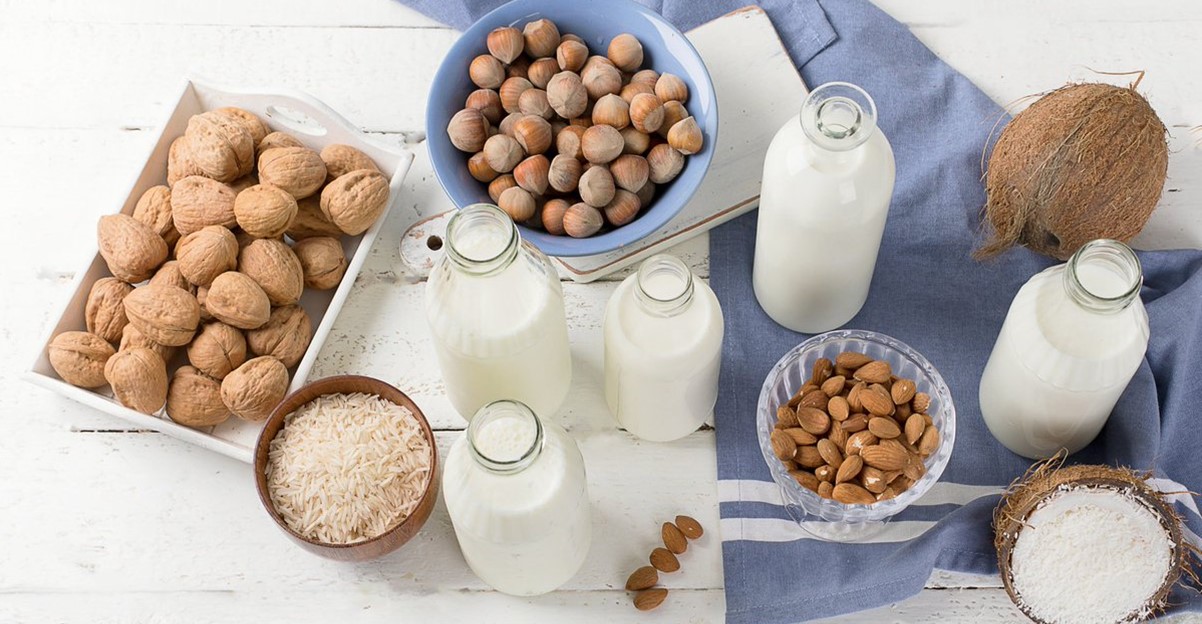

Plant-based drinks are increasing in popularity. They are chosen because of lactose intolerance, vegetarian or vegan diet, out of curiosity or simply for their taste. Their nutritional value is highly variable and difficult to compare with that of cow's milk. How to make the right choice?
Choose plant-based drinks that are richer in protein.s. Often absent or significantly lacking at breakfast and snacks, protein helps maintain the right energy level until the next snack or meal. If you opt for a lower protein option, keep in mind supplementing with other protein sources and vary these throughout the day.
Look for drinks that mention "enriched". One cup of fortified plant-based drink will provide as much calcium as cow's milk, 30% of the recommended daily intake. Remember to shake the container well, as added calcium tends to settle to the container's bottom. Cow's milk is also the primary dietary source of vitamin D, essential for calcium absorption. Fortified plant-based beverages will provide 45% of the recommended daily intake per cup. Needs are challenging to meet otherwise, and vitamin D supplementation is even recommended for children and during the late fall/winter season for adults.
Choose the unsweetened versions. Some plant-based beverages may contain a large number of carbohydrates. When flavoured, they can provide a lot of added sugars. Look out for this! However, they do not contain lactose, the sugar naturally found in cow's milk.
Plant-based beverages also have the advantage of being generally lower in fat..
Regardless of their level of fortification, it is imperative to remember that until the age of 2, breast milk, infant formula or pasteurized whole milk (only from 9 months of age) remain the beverages to give to children for:
- better quality proteins and in the right quantity
- the much higher content of vitamins and minerals
- the range and types of lipids
These nutrients are essential for their growth and the proper development of their brains.
The best choices
Soymilk is the closest to cow's milk in terms of composition. It is the only plant-based drink that contains complete proteins, i.e. it has all the essential amino acids. One cup provides 6 g. As a rule, it is enriched. However, be careful with flavoured versions, which may contain up to 20 g of sugar per cup and may not be enriched. Soy is also interesting for its isoflavones and phytoestrogens values, potentially beneficial for breast cancer.
Pea milk is as rich in protein as cow's milk, 8 g per cup. It is rich in potassium, an ally to prevent hypertension. It has a smooth taste. Enriched, it is an excellent choice!
Oat milk tastes sweeter and is naturally higher in carbohydrates, about 18 g per cup. In comparison, cow's milk provides 12 g of carbohydrates. It provides 4 g of protein per serving. Enriched, it is an interesting compromise between soymilk, pea milk and other plant-based beverages.
Chickpea milk is the newest addition to the plant-based drink aisle. It is the richest in protein at 10 g per cup, higher than cow's milk and soy and pea beverages. It is also interesting for its negligible carbohydrate content.
The ones we choose for fun
Rice milk is very mild in taste and contains no allergens. However, it is not a protein source, and it is one of the most popular plant-based drinks with carbohydrates; it can contain up to 24 g per cup!
Almond milk is one of the most popular. People tend to think it is a good source of protein because it comes from a nut. However, it provides only 1 to 2 g of protein per serving. Cashew milk has a similar nutritional value.
Coconut milk is one that is gaining in popularity. It has a fat profile similar to cow's milk containing little protein, no calcium, or vitamin D.
Flax and hemp milk are not a source of protein either.
Other drinks, such as barley, millet, buckwheat, etc., taste like the cereals they are made with. They are not always enriched and are also low in protein.
Did you know? The term "milk" is reserved for a product from a cow or other mammal. When it is a liquid obtained from plants, the term "plant-based milk" is used.
References
Lait de vache versus boissons végétales: des différences-nutritionnelles
L'offre grandissante des boissons végétales, comment s'y retrouver ?
Boissons végétales: laquelle choisir ?
Quelle boisson végétale choisir ?
Mes produits coups de cœur de l'Expo manger santé 2018
Boisson végétale non sucrée de pois
Boisson végétale de pois chiches
Image source: Culture nutrition